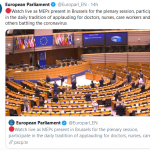The politics of the missing gender perspective: Responding to the Coronavirus pandemic through parliamentary politics
The social, political, economic, and health crises caused by the global coronavirus pandemic are deeply gendered – they reflect and exacerbate the inequalities in gender, race and ethnicity, disability, and class which preceded the crises. While men seem to suffer from more severe symptoms, the majority of front line workers in the hospitals, care homes, nurseries, schools and supermarkets facing the virus, often without adequate personal protective equipment, are women.

Generally, more women than men are positioned in precarious labour market positions, such as working on fixed term or part-time contracts or for smaller businesses with less access to credits. The lockdown moves care work from the paid economy to households, where women bear a large part of it, re-enforcing or even re-inventing traditional understandings of the family based on heteronormative couple and parent norms. This is exacerbated by limiting reproductive rights, including the access to abortion. Single parents, with a female share above 80% throughout Europe, have even more difficulties in combining work, care, and schooling responsibilities. Closed public outdoor spaces show divides along class with working class families suffering more. Simultaneously, instead of homes being safe havens, rates of domestic violence have drastically increased under lockdowns across the world. Those who have been most vulnerable before are now even more so with the positions of the homeless, refugees, and Roma particularly acute. Any national, European, and international responses to the crisis should therefore assess the gender impact of the chosen policies
The coronavirus crisis and its gendered impacts raise several questions in relation to parliaments and democratic politics – core issues of the EUGenDem project. Parliaments are the important democratic spaces to deliberate on appropriate measures and to control the governmental actions to contain the virus and manage its health, social, economic and political impacts. The European Parliament (EP), a supranational arena of exchange between its political groups, remains relatively powerless in driving national decisions in the corona crisis but has debated and adopted as co-legislator many of the EU-level response measures proposed by the European Commission. The pandemic and responses to it also pose new threats to democracy in the EU and reinforce processes of democratic backsliding.
The missing gender equality perspective
The gendered impacts of the pandemic and measures to contain it have not been reflected in the Commission’s coronavirus responses. Despite its self-obligation to gender mainstreaming, the EP has not brought the missing gender perspective to the debate in its own positions.
Within the EP, the awareness of the gendered impacts of the corona crisis varies. Whilst many political groups have taken the most vulnerable into account in their statements, the political groups have been mainly silent about gender (see statements from GUE/NGL, Greens/EFA, and EPP). The gender-dimension of the crisis has been best acknowledged by the S&D group who has called for a gender-sensitive response to the crisis.
During the financial and the Eurozone crises the EU’s crisis management measures were not gender mainstreamed, and gender equality became an irrelevant issue in the decision-making dominated by economic actors. These mistakes should not be repeated. The EP has a key role in holding the Commission and the member states accountable for their gender equality commitments in the midst of the new crisis.
Silenced gender equality actors
Committees on women’s rights and equality are often the key to ensuring that gender equality is included in the policy work of parliaments, and this holds also true for the EP. The EP Committee on Women’s Rights and Gender Equality (FEMM) is not only in charge of gender equality, but also functions as a supervisory body for gender mainstreaming in the other EP committees, who all have adopted gender mainstreaming action plans.
Given the coronavirus situation, the EP has suspended the work of many committees since April 2, amongst them the FEMM committee. Before and in the early days of Corona measures, the FEMM committee already pointed out the gendered impacts of measures and its chair Evelyn Regner (S&D) stressed the need to tackle immediately the likely increase in violence against women due to the lockdowns. The non-legislative FEMM committee will not meet until at least April 30. The EP suspension measures have thereby silenced a strong voice for promoting women’s rights and gender equality. It remains unclear how the EP will ensure taking gender aspects into account with this main site of expertise closed down.
In other contexts, parliamentary committees on equality have taken an active role in providing expertise in the coronavirus crisis and monitoring impacts. In the closed UK Parliament, the Women and Equalities Select Committee has launched an inquiry on the impacts of the coronavirus – and measures to tackle it – on gender and other equalities.
The sidelining of the FEMM committee is duplicated in the European Commission, where key decisions about the coronavirus are taken without gender equality actors: Commissioner Helena Dalli in charge of equality is not part of the Commission’s crisis response team.
Attacks against democracy and gender equality
Monitoring and ensuring that the EU defends gender equality and women’s rights is essential at this time, as examples in Poland and Hungary show. In both countries, governments are using the pandemic situation to restrict democratic freedoms and push anti-women and transphobic agendas along the way. In Hungary, the Fidesz government effectively blocked legal gender recognition for trans people on March 31st, as part of its ‘salad’ amendments to national law to fight the coronavirus crisis.
The situation is also used in Poland to push for a further restriction of sexual and reproductive health rights (SRHR). The parliamentary agenda for mid-April included the first readings of bills restricting abortion and criminalizing sexual education. On April 16th, both legislative proposals passed in the first plenary reading for further committee work and second readings. The first bill proposes to outlaw one of the three legal exceptions allowing abortion in Poland (‘serious anomaly’ of the foetus, which accounts for a majority of legal terminations in the country). Similar attempts have been made several times by the Law and Justice government since 2016, but have always been stopped by mass women’s mobilizations and protests outpouring in the streets in the form of ‘black protests’ and ‘women’s strikes’.
This time with the Covid19 restrictions in place, people could not take to the streets in the same way. In Poland, persons even from the same household, can be out in the street only keeping 2-meter distances and for ‘essential’ reasons only. There are, however, attempts at ‘quarantine protests’: posters in the windows or in shop queues, pictures on social media, and emailing campaigns. In one sign of support, 170 parliamentarians (including MEPs) from 24 European countries have signed a letter calling for action against Poland exploiting the Covid19 public health crisis to restrict women’s rights.
The other Polish bill attacking SRHR is also a ‘civic’ legislative proposal (a smokescreen for a pro-government ultraconservative think tank Ordo Iuris), which is an amendment to the criminal law article concerning paedophilia and child abuse. The new legislation proposes to criminalize sexual education as the ‘promotion of underage sexual activity’. MEPs have condemned the first proposal of the law in November 2019.
But these are not the only undemocratic laws passed in Central and Eastern Europe under the guise of a pandemic response. Apart from the more widely debated issues like the implementing of ‘extraordinary measures’ in Hungary or the last-minute unconstitutional changes to the electoral law allowing Polish authorities to hold presidential elections at the expected height of the coronavirus spread, there have been legislative changes with gendered intersectional effects that have not gained such publicity. For instance, the new Hungarian ‘Enabling Law’ furthers the neoliberal clientelist agenda of the Orban regime, pursuing a neoliberalization of public services and an increasing abandonment of welfare policies in favour of the punitive ‘workfare’ model. Most of the new pandemic response measures are about protecting business interests and not the most vulnerable groups in society.
Also the Polish governmental response, the so-called ‘Anti-Crisis Shields’ strongly focus on helping the financial and banking sectors and big business at the expense of workers and employees. According to a slew of these new ‘shield’ laws, public sector employees (a feminized field) can be fired more easily and their salaries can be cut; working weeks can be extended to 60 hours; while the miserable levels of care and unemployment benefits remain untackled. At best, it is a meagre response that will be barely of use to small businesses and actually harmful to most workers, as it takes recourse to the worst austerity models from the 2008-9 economic crisis.
The European Parliament’s practices
Coronavirus has led to innovations in parliamentary practices, in order for the EP and its groups to retain their key functions as the space and time of parliamentary activity has changed. There have been possibilities afforded by remote voting for those on maternity/paternity and parental leave, and the parliament has offered to lend its facilities to the city of Brussels.
However, MEPs and EP staff are differently positioned in terms of working from home, those with small children and elderly parents need to combine parliamentary work with care responsibilities. Scrutiny on the European Parliament’s response to corona has included suggestions of an imbalanced approach between accredited parliamentary assistants and MEPs. The terms and conditions of subcontracted cleaning staff (12.55) in the EP seem even more prescient, since these key workers have shown to be integral, not only in the European-wide coronavirus response, but to the everyday functioning of society.
In sum, the corona crisis has not only laid bare existing intersectional inequalities throughout Europe and the world, but is also in many cases exacerbating them. This will be a test of how far the European Parliament is a significant actor in gender policy and its internal practices as well as an opportunity to reflect on gender, power, and parliamentary futures. Given that we know that crises are often the times when gender equality is pushed on side, we also call for the Commission’s gender equality strategy not to be forgotten.
This blog post has been co-authored by the EUGenDem team.

